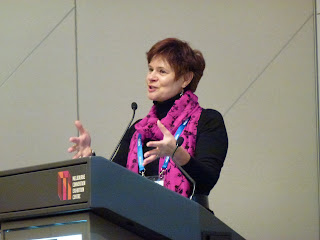July 16-21 July, 2012
And what a week it was for 700 home economists and health professionals from around the world gathered in Melbourne, Australia.
The IFHE World Congress is held every four years - it is truly an Olympic event for Home Economics where latest research and education ideas are shared and opportunities for networking are infinite.
Our keynote speaker Dr Vandana Shiva, Founder of Navdanya International, spoke about gender equity as part of her description of her 'nine seeds' biodiversity project in India and the role of women as the harvesters of original seeds. Read more here at Navdanya International
Read more about the program here at IFHE World Congress.
We also welcomed Melbourne Home Economist and CEO of Home Economics Victoria, Ms Carol Warren as our International Federation for Home Economics new President.
We are justly proud of Carol as we are of Ms Gail Boddy our Executive Officer, IFHE Pacific Region and Professor Tony Worsley our incoming Vice-President, IFHE Pacific Region.
I had the pleasure to present 2 papers based on my research.
Predictors of the importance of food skills amongst home economics teachers the aim of which was to investigate relationships between demographic characteristics and life orientations of home economics teachers as predictors of the importance of the essential food skills that ought to be taught to students in secondary schools in Victoria, Australia.
Food Skills Rating Checklist: An evaluation instrument for use in skill-based programs in schools.
The aim of this study was to develop a food skills rating checklist that could be used as a food skills evaluation instrument by home economics teachers and other facilitators of skill-based programs. To the best of our knowledge, no reliable and validated evaluation instrument currently exists.
Research is currently being conducted. Initial results suggested that a rating skills checklist would have merit and application for use by home economics teachers in schools and other facilitators in community skill-based programs. The use of a reliable, validated rating checklist would provide home economics teachers with a sustainable and valuable tool to help them evaluate students’ progression of food skills.


